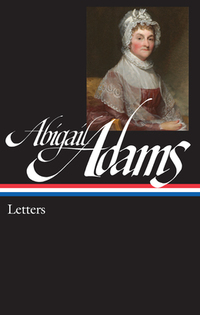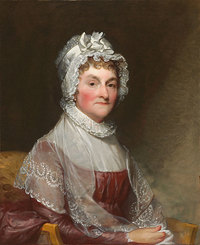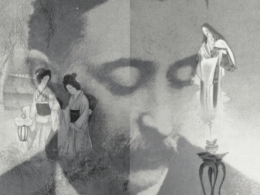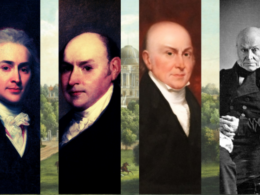
Library of America’s Founding Era Collection expands dramatically this spring with the publication of Abigail Adams: Letters, an unprecedented edition presenting 430 letters by the First Lady who was an incisive and witty commentator on the American Revolution and the early republic. The most comprehensive collection to date of Adams’s correspondence, the book sheds new light on her relationships with husband John and son John Quincy and on her advocacy for the rights of women.
The volume’s editor is Edith Gelles, Senior Scholar at Stanford’s Michelle R. Clayman Institute for Gender Research and the author of Abigail & John: Portrait of a Marriage in addition to the biographies Abigail Adams: A Writing Life and Portia: The World of Abigail Adams.
LOA: Library of America has published many volumes collecting the essential texts of the Founding Era, but this is the first devoted to writing by a woman. What makes the letters of Abigail Adams so significant? What do they add to our understanding of the American Revolution?

Gelles: Abigail Adams’s letters are the best record we have of the American Revolution from a woman’s point of view. No other Founding family has left such a trove of family letters as the Adamses. Both Washington and Jefferson destroyed their personal correspondence. Only the Adamses preserved their papers with such consideration for their value to history. Abigail’s letters describe her personal experiences on the home front during the war, including days of terror when the British bombardment of Boston threatened to expand to their coastal village and days of exhaustion as she opened the family home to refugees from Boston. They further describe the impact of epidemics of both diphtheria and smallpox. She also assumed her husband’s family role in his absence, managing the farm, earning an income from small merchandizing enterprises, and handling their finances. Abigail’s life was transformed—as were the lives of all women—in wartime.
Following the war, she traveled to Europe to join her diplomat husband, then returned to witness the founding of the new nation—as the wife of the vice president and then president. Her letters tell stories that are unique in their presentation of the history of an era as observed through the eyes, then the pen, of an astute, sensitive, perceptive, and eloquent participant and witness.
LOA: In probably her most famous letter, written on March 31, 1776, Adams urged her husband and his fellow delegates to the Continental Congress in Philadelphia to “Remember the Ladies” as they prepared to establish new and independent governments. What specifically did she have in mind—and what was John Adams’s response?
Gelles: Abigail lived in a patriarchal world that was neither unique in history or to America. In most respects she accepted patriarchy as the normal state of the human condition. That means she accepted a traditionally “essentialist” worldview in which male power prevailed over most institutions, including religion, government, the economy, and the family, and women and men were meant to operate in “separate spheres” of the home and the wider world. The Revolution, as is the case with all wars, transformed that perspective, because when men left home to participate in the war, women had to take over their roles.
One of the qualities that I have most admired about Abigail Adams and that drew me to her in the first place, was her fundamental pride in being a woman. She valued being female and insisted that women’s roles, work, perspective—women’s domestic lives—were equally valuable as those of men. She did not believe that men’s minds were superior to women’s minds or that women were any less capable of learning than men. She encouraged her daughter to study Latin along with her sons and she educated herself over her lifetime in literature, history, and politics. She became a very erudite woman. And as she assumed more and more responsibility in the masculine sphere of work during John’s absences, she grew more confident about herself and her abilities.
Still, she experienced many constraints and observed many more. There were economic restrictions that limited her actions. She could not legally purchase or own land, though she speculated on property near home and in Vermont (her uncle Cotton Tufts negotiated and purchased in John’s name). She objected to the limitations placed on women’s education. She saw that women who were abused had little recourse to law and that women had control neither legally nor by custom over their children or their households. (These legal changes would come slowly during the nineteenth century.) Abigail’s awareness of the restraints on women and her claims for justice were heightened by her wartime experiences.

When she learned that the men of the Continental Congress were considering a vote for independence in the spring of 1776 and surmised that a new constitution would be created to establish a new country, she took the opportunity to remind her husband, who she knew had great influence at the Congress, to persuade the delegates to make provisions for a system that would protect women. “Do not put such unlimited power in the hands of Husbands. Remember all Men would be tyrants if they could,” she wrote, and continued: “That your Sex are Naturally Tyrannical is a Truth so thoroughly established as to admit of no dispute.” She suggested that men give up “the harsh title of Master for the more tender and endearing one of Friend.” In that patriarchal and hierarchical world, she requested that “in immitation of the Supreem Being,” men should use their “power only for our happiness.” Abigail did not demand political equality but rather social justice. She reminded her husband to “Remember the Ladies, and be more generous and favourable to them than your ancestors.”
“Remember the ladies” was the boldest and most “revolutionary” statement made in that revolutionary era to petition for the rights of women as human beings. It has become Abigail’s signature statement. What it was not was a demand for the vote or a seat in congress, for political rights. That would have been beyond her imagination in that patriarchal era. But it was a claim on women’s just status in a patriarchal world.
John’s response was to make a joke about her request to “remember the ladies.” It was the best he could do in a situation where the men in Philadelphia were running a war as well as negotiating the separation of the colonies from Britain. Women’s rights were not on their agenda.
LOA: You have likened Adams’s genius as a social commentator to that of another writer included in the Library of America series, Alexis de Tocqueville. What made her such a keen observer?
Gelles: What I meant by this comparison is that Abigail’s letters capture the culture and events of a particular place and time in history. She was a keen observer of people and events who interpreted them perceptively. She also possessed the gift of being able to record her observations in prose that is always direct and very often eloquent. “My letters to you are first thoughts,” she explained. She rarely copied, but sent drafts as she composed them, so that her moods, emotions, and sensibilities come vividly to the page.
LOA: Can we speculate as to how Adams might have reacted to her letters being published?
Gelles: “Pray burn this letter,” was Abigail’s oft-repeated request to John, sometimes because the letter contained sensitive information, but more often because she was unduly modest about her prose style. John, fortunately, did not comply. “Your letters are much better than mine,” he responded. When, at the end of her life, a friend suggested their publication, she once more demurred. The first publication of her letters was a highly edited edition by her grandson in 1840 that became immensely popular. In part, that edition, which remained continuously in print, accounts for her reputation as a letter writer. This current publication of her letters by Library of America is the first exclusive collection of her letters that are true to the originals without correction to her style or content.
LOA: How would you characterize Adams’s influence on the careers of her husband John, and her son John Quincy?
Gelles: Abigail’s greatest contribution to John’s career as a statesman was that she never prevented him from serving his country, despite the enormous sacrifice that it entailed for her. There were several times when she wanted him to return home, but each time she either suppressed her wishes or conceded to his. She persuaded herself that without his presence and his contribution, the Revolutionary project would falter.
Beyond this, her contributions are legion. She supplied him with information about local politics and people during the Revolution. When she joined him in Europe, it was as companion and diplomatic consort. As the wife of the vice president and then president she was completely supportive, a trustworthy and intelligent and wise confidante. Did she influence his policies? I think that issue begs the question of John’s firm opinions and passionate character. I think she was totally supportive but not the architect of his positions or strategies.
Both Abigail and John treated John Quincy as their “prodigy” child from his earliest youth. They promoted the Puritan concept of “duty,” stressing that the purpose of life was service to others, be it the immediate community or the nation. John Quincy learned that lesson well.
LOA: Does this collection reveal aspects of her life and character that biographers of John and John Quincy have gotten wrong, or overlooked entirely?
Yes, of course. What’s unique about the LOA edition is that it focuses exclusively on Abigail’s letters, without those of family and friends, as is the case with other editions. The narrative arc is developed entirely from her own storytelling. The only earlier edition, Charles Francis Adams’s of 1840, was highly edited, brief, and selective. It corrected her prose style, added punctuation, and eliminated subjects considered sensitive such as references to illness, money, and sex. Further, this edition includes letters that were written after 1800 and have never appeared in print.
LOA: Speaking of which, this volume includes more than 100 letters that have never been published before. Can you describe the historical detective work that went into tracking down some of this correspondence? Were there any especially noteworthy discoveries or surprises for you?
Gelles: It was an immense job to track down the letters written after 1800, because the Adams Papers project, the mother lode of Adams publication at the Massachusetts Historical Society, has only progressed up to 1798. Letters for the later years are available only on microfilm and didn’t appear online until late last summer. We had to do a huge amount of detective work not just to find letters but also to transcribe them. Some few letters are still in private hands; others are in auction houses. I think we compiled the most complete record of Abigail’s letters that is available.
It was a surprise to me to learn that there were approximately 820 letters written by Abigail Adams after 1800, mostly to family and friends (like Louisa Catherine Adams and Mercy Otis Warren), many domestic in nature. That is almost a quarter of her lifetime of letter writing. Of those, I selected about ninety for the LOA volume. Another surprise to me was that of the approximate 2,300 letters she wrote, only 450 were written to John Adams. He wrote many more to her, almost twice as many, though many were merely notes.
LOA: What would Abigail Adams have thought of a woman president of the United States?
Gelles: It’s about time!



